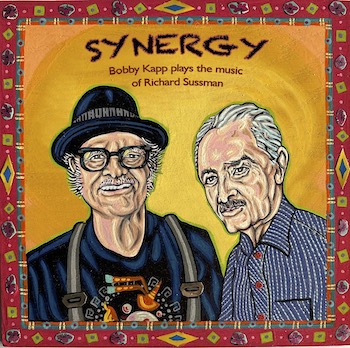Jazz Album Review: A Creative “Synergy—Bobby Kapp Plays the Music of Richard Sussman”
By Allen Michie
The arrangements seem to emerge organically from the structure and feel of the compositions and harmonies, like leaves unfolding from the stem of an exotic plant.
Synergy—Bobby Kapp Plays the Music of Richard Sussman (Tweed Boulevard)
 Who plays the music of whom?
Who plays the music of whom?
You may not be familiar with either drummer Bobby Kapp or pianist Richard Sussman, but both are jazz veterans with albums to their credits and sideman gigs that include Marion Brown, Gato Barbieri, Noah Howard, Matthew Shipp, William Parker (Kapp) and Lionel Hampton, Buddy Rich, Lee Konitz, Steve Slagle, and Randy Brecker (Sussman). When he got the opportunity to lead his own date, Kapp made the wise decision to commission Sussman to write a full program of originals.
Sussman, on the jazz faculty at the Manhattan School of Music, knows his way around modern classical music. There are elements of that here in the complex melodies that uncoil logically over the advanced harmonies. The choice of instrumentation has a classical slant to it as well, including violin (Zach Brock), French horn (John Clark), and clarinet (Aaron Irwin). Add to that the traditional jazz quartet of tenor sax (Abraham Burton), bass (Harvie S), and Kapp & Sussman on drums and piano, and Sussman has a broad palette to use for his distinctive and unified musical statement here.
Sussman’s arrangements are creative and satisfying. The instrumentation and colors constantly shift to support the melodies. On “Trance Dance,” the low Bb clarinet provides a vamp, and the solo voices take their turns emerging from an additional overlying vamp from the horns and piano. The combined sepia sound of mid-range violin, tenor sax, piano, and clarinet is used throughout to memorable effect. Sometimes compositions and arrangements seem at odds, where one seems too flimsy to support the weight of the other (it can go both ways). But that is never the case here. The arrangements seem to emerge organically from the structure and feel of the compositions and harmonies, like leaves unfolding from the stem of an exotic plant.
For example, on “From the Heart,” the melody goes minor where you think it might go major, but it makes perfect sense in the larger context of the arrangement. The band can swing, too, as on “Tweed Boulevard” or “Inner Space,” with Kapp laying down a groove and the experienced pro Harvie S walking steady. But then the swing on “Inner Space” gently falls apart into a freer structure, and Burton takes the song out on tenor. Burton may be a major discovery for you, as he was for me — at times he sounds like mid-career Coltrane, both in his dry tone and his controlled harmonic explorations. Brock is also a standout soloist on violin, and it’s well worth giving the album a second listen just to single out the varied contributions of those two.
Even though it’s nominally his own session, drummer Kapp may be the weakest link here. He keeps it loose and flexible, which is usually the way it should be for compositions like these, but sometimes the arrangements demand a little more snap, especially behind the many unison passages. There’s not a lot of color and variety in his basic drum kit, and the session could have benefited from a wider array of cymbals and percussion sounds.
There’s an odd unwritten rule for jazz pianists to avoid the sustain pedal (Keith Jarrett excepted), but Sussman has the good taste to ignore that rule when necessary, giving his solos a ringing and distant quality in places. On “Tweed Boulevard,” the conventional melodic line he improvises with the right hand rests obliquely against the Bartok-like harmonies from the left hand. Elsewhere, Sussman can play a bit like Jaki Byard, supporting the overall impression that the compositions, arrangements, and soloing on the album owe much to the later works of Charles Mingus. It’s not a comparison I make lightly. Burton and Sussman in particular would have been an excellent fit in one of Mingus’s bands, and this record will hopefully give them some wider visibility.
Christian McBride said of a Terri Lyne Carrington track in the August 2023 issue of Downbeat, “I love music that kisses the curb, like it’s about to go off the road but it doesn’t.” That’s a perfect description of the freebop on this session. With this album’s cover art and title, you might flip right by it at the record store, but it’s well worth seeking out.
Allen Michie works in higher education administration in Austin, Texas. He’s the moderator of the Jazztodon.com instance on Mastodon and the Miles Davis Discussion Group on Facebook. You can read an archive of his essays and reviews allenmichie.medium.com.
Tagged: Bobby Kapp, Richard Sussman, Synergy
